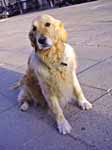|
Dear Love Hound,
When your Ayi was a wee lass, the closest she came to
looking after animals was chasing cockroaches out of
the kitchen. Animals such as cats and dogs have always
been commonplace in the Middle Kingdom, but have been
considered pests by civilized city dwellers for centuries.

But these days it seems every family
in Beijing is running around with a new best friend,
be it of the canine, feline or piscine variety. After
Hello Kitty mobile phone attachments, fur-trimmed leather
coats, and handbags for men, the urban pet has become
the newest "must-have" accessory.
Treatment of animals varies in China.
In the south there's a saying that if it "flies in the
air, runs on the ground, or swims in the sea" it can
be eaten. This is especially true of Guangzhou, where
visitors who go to animal markets have trouble deciding
whether the creatures in the cages are destined for
the pet basket or the cooking pot.
North of the Yangtze River, animal
markets of any kind are a relatively new concept. In
Beijing, even given the growing popularity of pets,
places to buy them are hard to come by. The one exception
is birds, which have long been accepted as traditional
Chinese pets. Often "newer" varieties of domesticated
creatures, such as dogs and cats, are sold in the same
markets that sell birds.
Buying animals in Beijing can still
feel like an underground mission. It is not uncommon
to see shifty-eyed men standing on street corners whipping
out fluffy puppies from inside their black coats or
toting random caged animals that disappear at the first
sight of the law.
There are a few legitimate pet markets
in Beijing, including the Guanyuan Market south of Chegongzhuang
on the Second Ring Road. Little "Rovers" and "Snowballs"
waiting to be adopted are hawked among Chinese paintings,
ancient coins and glazed pottery.
When selecting a pet to take home,
the caveat "buyer beware" may never ring truer. The
little Pekinese with cute bulging eyes and glowing white
fur may well lose its shine in the wash (word is that
some of the puppies are bleached and dyed) and suddenly
possess a range of undiagnosed illnesses. As with purchasing
a pet anywhere in the world, it is better to know the
owner and the animal's mother before you buy.
Alternatively, you can buy dogs at
the Xiwu Horse Club, which also has a breeding kennel.
All the dogs there have received vaccinations and there
are members of staff there who can speak English. Although
the breeding farm is in the suburbs you can first stop
by their office, located in the City Hotel on Gongti
North Road.
Beijing also has an animal shelter
(ren yu dongwu huanbao jiaoyu zhongxin) just beyond
the Fourth Ring Road, which allows you to adopt animals
that have been abandoned. If you're looking for cuddly
puppies and kittens, this may not be the place for you
since most of the animals range from one to five years-old.
But all are fully vaccinated and the center provides
the necessary documents you will need to obtain a license.
The popularity of pets has given
rise to improved veterinary services throughout Beijing.
Vets have long existed in China, although most were
mainly based in rural areas and received only rudimentary
training in veterinary medicine. Only recently have
vets been able to relinquish the stigma associated with
the bumpkin life of the countryside and receive formal
education. Even so, most vets emerging around Beijing
are likely biology grads who taught themselves veterinary
science.
Once you have found your life-long
buddy, get the required inoculations and maintain a
regular check-up schedule. Keep in mind that many animals
are still unregistered in Beijing so rabies vaccinations
should be administered every six months. Also, unless
you have your pet neutered you will at some point end
up with unwanted visitors and new members of the family.
If you don't possess a wide vocabulary
of Chinese veterinary terms, Dr. Dai Shu offers services,
including house calls, in English. One of the few Beijing
vets with medical qualifications and overseas experience,
he can either examine your pet in his clinic or at your
home. Another plus, he often has vets from overseas
working with him.
Other downtown clinics include the
Guanyuan Pet Center (guanyuan chongwu zhongxin) in Xizhimen
and the Kang Kang Center (kangkang chongwu baojian zhongxin)
in Jinsong, just opposite the Jinsong Hospital (jinsong
yiyuan). Kang Kang's other center is located behind
the International Exhibition Center. All provide general
medical care, including check-ups and shots.
Maintaining a healthy diet for your
pet will decrease the number of times you have to visit
the vet. Pet foods such as Whiskas can be found at any
of the above clinics, along with food designed for more
specific dietary requirements, such as canine kidney
problems.
The Yiya World of Park Pets (yiya
shijie chongwu zhongxin) on Gongti North Road, in addition
to selling animals, offers a variety of pet accessories,
such as dog leashes, toys, baskets and fur brushes.
Pet food and litter can also be purchased at general
food stores such as the Friendship Store on Jianguomenwai
and shops in Sanlitun such as Jenny Lou's.
Before making a final decision, understand
that there are strict laws in China that govern the
ownership of dogs. In order to obtain the proper license
you will first have to go to your local police station
and apply for permission to own a dog. You will then
be given a form. Bring the form and your dog to one
of the animal hospitals in Beijing for a brief medical
examination. Following this, the animal must receive
basic vaccination.
If all tests are cleared, you are
then eligible to apply for a license, which means heading
back to the police station.
The prices for dog licenses are high
and require the owner to pay RMB5,000 for the first
year of the license and then RMB2,000 every year thereafter.
The application process should take around 10 days.
Although, as with anything involving red tape in China,
be prepared for a longer wait.
Animal Markets
and Pet Care
Beijing Banlu Pet Hospital
Yuyan Hutong No. Jia 6, Xicheng District. In front of
Guanyuan Market. For veterinary checkups.
Open 9 am-10 pm, tel: 6616-2134
Xiwu International Horse Club
Office: City Hotel, No. 4 Gongti North Road
Open 9 am-5 pm, tel: 6500-7799 ext 1107
Ask for Mr. He
Beijing Animal Shelter
Junzhuangzhen, Mentougou District, a half-hour car drive
from the Longquan Hotel. Tel: 6081-0819
Dr. Dai Shu
24-hour emergency service
BP: 6491-1166 hu 8771
Beijing Kangkang Pet Health Center
Branch No.1
East Second Ring Road, Jinsong Xikou, east of Jinsong
Pharmacy, Chaoyang District
Open 8:30 am-10 pm; 24-hour emergency service available,
tel: 6770-0039
Guanyuan Market
South of Chegongzhuang subway station stop, along the
Second Ring Road.
|



